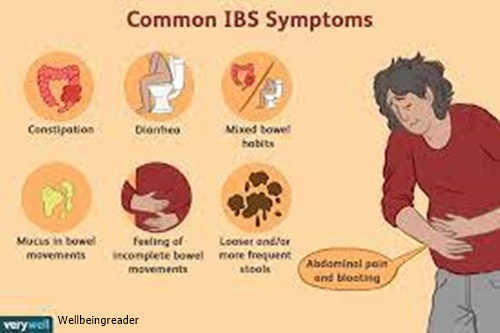Irritable Bowel Syndrome also known as IBS is a gastrointestinal disorder. It affects large intestine. There is no specific cause of IBS. It is a group of disorders. Hence, called as a syndrome. It mainly affects motility. And can either be diarrhea dominating. Or constipation dominated or mixed. IBS was previously called as spastic or nervous colon. It is a GIT disorder accompanied by group of symptoms mainly causing abdominal pain or diarrhea. It is a functional disorder.
There are many forms of this disease. Diarrhea dominating IBS presents with symptoms of chronic or recurrent episodes of diarrhea. While constipation dominating IBS presents with the symptoms of abdominal pain mainly in right iliac fossa. Or any discomfort in lower abdomen associated with constipation. While in some people it presents with both diarrhea and constipation. We can make a diagnosis on the basis of duration (at least six months) and the frequency of symptoms (at least three times a month). There is no specific cure for this disease. But treatment options includes life style and dietary modifications. According to doctors there is no specific dietary recommendations. Every patient has different triggers. So, one should adopt dietary habits according to triggers. It is best to see a doctor if you are having GIT symptoms with pain and diarrhea.
IBS causes

Exact cause of this disease is unknown. But following causes are of interest:
- Due to abnormal movements of colon nd small intestine.
- Due to hypersensitivity to pain
- Increased sensitivity to food.
- Any bacterial or viral infection can trigger IBS.
- Anxiety and depression is known to be a major cause of IBS among women.
- Off-balance of hormones.
- Bacterial overgrowth in small intestine
- Genetics
Signs and Symptoms of Irritable Bowel Syndrome
Patients of IBS mostly presents with Abdominal pain and diarrhea. But can also cause following symptoms.
- Diarrhea dominating IBS can presents with sudden feel of bowel movements and loose stools.
- Constipation dominating IBS can present with forceful bowel movements and less frequency of stools.
- Bloating
- Swelling in abdomen
- Pain in abdomen
- Cramping after eating food
- Vomiting
- Mucosa in stools
- Weight loss
- Decreased appetite
- Women may have increased symptoms during periods
Foods you can eat to relieve your symptoms
- Diet with high fiber content
- Increase intake of water
- Decreased fat intake
- Increased carbohydrate intake
- Probiotics
- Diet with high fiber amount can relieve constipation. But in some cases of IBS, but it can also worsen some symptoms such as bloating and gas. According to research current recommendation of daily fiber intake is 20-35 grams.
Foods to avoid in case of IBS
- Vegetables that increase gas
- High-fat food
- Alcohol
- Caffeine
- Chewing gum
- Nuts
- Food with high sugar
IBS Vs IBD
Although both IBS and IBD can have same symptoms which includes pain in abdomen, diarrhea, and urgent bowel movements. But IBS is not same as IBD.
- IBD can be due to ulcerative colitis or Crohn’s disease and is more severe than IBS.
- IBS is a functional GIT disorder associated with decreased motility.
- IBS does not cause inflammation or any permanent damage to tissue in GIT. While IBD cause inflammation in GIT and can cause permanent damage.
How to diagnose Irritable Bowel Syndrome
It can be diagnosed by excluding other GI disorders with similar symptoms. Complete history and physical examination is important for diagnosis. We can make a diagnosis on the basis of duration (at least six months) and the frequency of symptoms (at least three times a month).
Tests like Blood test, X-ray, Stool test, CT scan can help to diagnose IBS. Although these tests does not show any specific findings but can exclude other GI causes.
Treatment of Irritable Bowel Syndrome
There is no specific cure for this disease. But treatment options includes life style and dietary modifications. According to doctors there is no specific dietary recommendations. Every patient has different triggers. So, one should adopt dietary habits according to triggers. It is best to see a doctor if you are having GIT symptoms with pain and diarrhea.
If this does not work then doctor may prescribe you medications.
Medicines for diarrhea
- Antidiarrheal medications can treat severe diarrhea and bloating.
- Females with IBS experiencing severe diarrhea should use Alosetron.
- Rifaximin can treat IBS related diarrhea.
- Bile acid binders can help patients with IBS-D.
Medicines for constipation
- OTC laxatives such as MiraLax and DulcoLax can help relieve constipation and make bowel movements regular.
- Two drugs mainly used to treat IBS are Amitiza and Linzess, are recommended.
- SSRI antidepressants and anxiolytics can used to treat anxiety triggers of IBS.
Other drugs used to treat IBS are
- Anti-depressants
- Anti-anxiety medications
- Antibiotics
- Bismuth salicylates
- Anti-spasmodic
- Life style modifications
